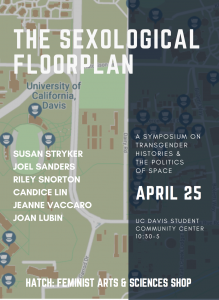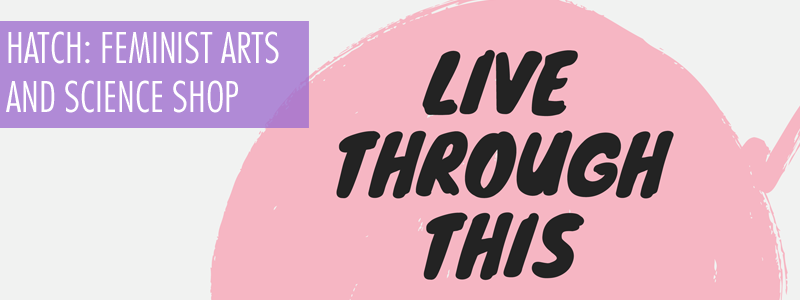The Sexological Floorplan
with talks by scholar-artist-activists SUSAN STRYKER, JOELS SANDERS, C. RILEY SNORTON, CANDICE LIN, JOAN LUBIN and JEANNE VACCARO
Wednesday, April 25 from 10:30-5 at the UC Davis Student Community Center, Room D
The Sexological Floorplan is a symposium exploring transgender histories and the politics of space. Across three collaborative duets theorizing the administration of sex, race, and dis/ability, The Sexological Floorplan excavates ancillary, adjacent, and minor spaces in underthought proximity to the bureaucratization of social life. Spanning the 19th century to our contemporary moment, the scholar-artist-activists assembled consider the gynecological curtain, the sexological waiting room, and the public toilet.

10:30 Coffee (room E)
10:45 Welcome
11:00-12:30 Riley Snorton & Candice Lin, response by Kathleen Frederickson
“Non/human Matter: Sheets and the Folding of Flesh”
We begin our exploration of the sexological floorplan with meditations on matter, in the hardness of porcelain and the material differences between the body and flesh. Drawing upon variable references, including Baldwin’s Giovanni’s Room and its relationship to an image of his trip in Istanbul and Jean Baret’s binding practices and experience with hazing rituals, Lin explains the proliferative uses and polyvalence of sheets in relation to the constitution of the domestic scene. Snorton elaborates with a reading of Robert Thom’s image of J. Marion Sims and the founding of American gynecology, in which the sheets figure a scene of supposed medico-scientific neutrality by demarcating the medical site from captive quarters that mirrors the staging of sheets in the artist’s studio. Thom’s depiction of medical discovery as an anticipatory gesture of violence unfolds onto a reflection of Lin’s installation, “the long-lasting intimacies of strangers” which considers Lynn Margulis’s theory of coevolution in relationship to science fiction as a way to rethink Margulis’s descriptions of indigestability in racialized and gendered forms and the way these forms are highlighted through a play with negative and positive space, often using sheets. Snorton concludes by gesturing toward the implications of re-periodizing the gender clinic as emerging in the antebellum South, speculating on how temporality shifts dominant understandings of how sexology and the medical sciences have contributed to understandings of mutable gender.
12:30-1:00 Lunch (room E)
1:00-2:30 Joan Lubin and Jeanne Vaccaro, response by Mark Jerng
“The Waiting Room: Workaday Diagnosis and the Incorporation of Sexology”
The waiting room is the space you sit before your encounter with expertise, with bureaucracy, with knowledge, with intervention, with confirmation, disappointment, deferral. This presentation considers space-times of waiting in midcentury sexology. We center our analysis in the waiting room to map the floorplan of the sexological apparatus. The floorplan is a layout in space and time that conditions people into a particular set of relations to each other, themselves, and the space they cohabit. We seek to highlight the relation between aesthetic form and diagnostic form, and consider the places where aesthetics and diagnosis interact, intersect, and are indistinguishable from one another. This presentation considers a number of archival sites documenting the institutional histories of the waiting room and library spaces of the Kinsey Institute for Sex Research. We are interested in the way that the floorplan choreographs the interactions of experts and patients by way of the forms interposed between them, among them, around them, beneath them.
2:30-2:45 Break
2:45-4:15 Susan Stryker and Joel Sanders, response by Ryan Cartwright
“Stalled! The Gender Neutral Public Toilet Project”
In this presentation, historian and transgender theorist Susan Stryker and architect Joel Sanders discuss their work to design, promote, and actually build new kinds of public toilets that are not organized around the idea of a gender binary. Through a reorganization of public and private space, they contend, restrooms can not only better address the needs of trans people and people with non-binary identities, but actually provide less exlusionary, safer, and more equitable space for all. They will discuss what brought each of them to this work, situate their project in the historical trajectory of public toilet design, advocate for particular design solutions to problems of gender-based injustices, and describe their activist efforts to educate both the public and design professionals, change building codes, build political coalitions, and implement their ideas in practice.
4:15-5:30 Reception (room E)
________________________________________________________
Participants
Ryan Cartwright is an assistant professor of disability studies in the American Studies Program at UC Davis. He is affilaited with the graduate groups in Cultural Studies and Performance Studies, as well as the Designated Emphasis in Feminist Theory and Research. His book manuscript, Peculiar Places: A Queer/Crip History of Rural White Nonconformity, is under contract with the University of Chicago Press. Prior to his appointment at UC Davis, he was associate editor of MNopedia, a digital encyclopedia of Minnesota created by the Minnesota Historical Society.
Kathleen Frederickson researches the interfaces between economics, politics and the social and physical sciences. Along with her appointment in the Department of English, she is affiliated faculty for the Graduate Group in Cultural Studies, as well the programs in Science and Technology Studies, Critical Theory, and Feminist Theory and Research. Her areas of interest include Victorian literature and culture; feminist and queer studies; the history of physics, biology, psychology, and the social sciences; Marxism; and psychoanalysis. She is the author of The Ploy of Instinct: Victorian Sciences of Nature and Sexuality in Liberal Governance (2014), and is currently at work on her second book, on economics and the psychologization of density.
Mark Jerng joined the UC Davis Faculty in 2006. His research specializations include Asian American literature and transnationalism, critical race theory, science fiction and fantasy (especially by contemporary Asian American and African American authors), genre and narrative theory, and law and literature. He is the author of Racial Worldmaking: The Power of Popular Fiction. This project takes up particular popular genres – future war; plantation romance; sword and sorcery; alternate history – in order to analyze how genre formations inform our perceptual organizations of ‘race’ and ‘world.’ His first book, Claiming Others: Transracial Adoption and National Belonging, focuses on the ways in which shifting norms of race and kinship shape and naturalize our conceptions of personhood. It examines the phenomenon of transracial adoption from the 1820s to the present across Native American, African American, and Asian American contexts in fiction, memoir, legal history, and social work literature.
Candice Lin works in Altadena, California. She received her BA in both visual arts and semiotics from Brown University, in 2001, and MFA in New Genres from San Francisco Art Institute, in 2004. Her work has been exhibited at Portikus, Frankfurt (2018); Moderna Museet, Stockholm (2017); Bétonsalon—Center for Art and Research, Paris (2017); Human Resources, Los Angeles (2017); New Museum, New York (2017); SculptureCenter, Long Island City, New York (2017); Los Angeles Contemporary Exhibitions (2016); and Vincent Price Art Museum, Los Angeles (2013), among others. She is the recipient of several residencies, grants, and fellowships, including a California Community Foundation Award (2014), Fine Arts Work Center Residency (2012), Frankfurter Kunstverein Deutsche Börse Residency (2010), and Smithsonian Artist Research Fellowship (2009).
Joan Lubin is the 2017-2018 John Money Fellow for Scholars of Sexology at the Kinsey Institute for Sex Research in Bloomington, Indiana. Beginning in the Fall of 2018, she will be a Mellon Postdoctoral Fellow in science & literature in the Society for the Humanities and the English Department at Cornell University. Her dissertation, “Social Science Fictions,” examines the production of science as an aesthetic category, tracing the ways in which scale emerges as its organizing logic and most persistent formal problem. By thinking of science as an aesthetic category, and not just an ideological or methodological one, this project reads the scientism of the Cold War as the foundation for a set of literary experiments with scientific modes of representation. Each chapter identifies a site of representational negotiation at the interface of the literary and the social scientific to track how the answers ventured to the question of how to scale representations to reality repurposed mathematical formalism in the service of social realism and developed modes of narrative representation for an age of statistical aggregation.
Joel Sanders is the Principal of his New York based studio JSA and a Professor of Architecture at Yale University. JSA projects have been featured in international exhibitions including MoMA, SF MoMA, Art Institute of Chicago and Carnegie Museum of Art. The firm has received numerous awards, including six New York Chapter AIA Awards, two New York State AIA Awards, an Interior Design Best of Year Award, and two Design Citations from Progressive Architecture. Editor of Stud: Architectures of Masculinity and Groundwork: Between Landscape and Architecture with Diana Balmori, Sanders’s writings and practice have explored the complex relationship between culture and social space, looking at the impact that evolving cultural forces (such as gender identity and the body, technology and new media, and the nature/culture dualism) have on the designed environment.m.
Riley Snorton is Visiting Associate Professor of American Studies and Ethnicity at the University of Southern California and Associate Professor of Africana Studies at Cornell University. He earned his PhD in Communication and Culture, with graduate certificates in Africana Studies and Gender and Sexuality Studies from the University of Pennsylvania in 2010. He is a recipient of a predoctoral fellowship at the W.E.B. Dubois Institute at Harvard University (2009), a Mellon postdoctoral fellowship at Pomona College (2010), and a National Endowment for the Humanities fellowship at the Schomburg Center for Research in Black Culture (2015). Snorton’s research and teaching expertise include cultural theory, queer and transgender theory and history, Africana studies, performance studies, and popular culture. He has published articles in the Black Scholar, the International Journal of Communication, Hypatia: A Journal of Feminist Philosophy, Souls: A Critical Journal of Black Politics, and Culture and Society. Snorton’s first book, Nobody Is Supposed to Know: Black Sexuality on the Down Low (University of Minnesota Press, 2014), traces the emergence and circulation of the down low in news and popular culture. His second book, Black on Both Sides: A Racial History of Trans Identity (University of Minnesota Press, 2017) is a finalist for a Lambda Literary prize.
Susan Stryker is an award-winning scholar and filmmaker whose historical research, theoretical writing, and creative works have helped shape the cultural conversation on transgender topics since the early 1990s. Dr. Stryker earned her Ph.D. in United States History at the University of California-Berkeley in 1992, later held a Ford Foundation/Social Science Research Council post-doctoral fellowship in sexuality studies at Stanford University, and has been a distinguished visiting faculty member at Harvard University, Macquarie University in Sydney, Simon Fraser University in Vancouver, and the University of California-Santa Cruz. She is the author, co-author, editor, or co-editor of numerous books and anthologies, including Gay by the Bay: A History of Queer Culture in the San Francisco Bay Area (Chronicle 1996), Queer Pulp: Perverse Passions in the Golden Age of the Paperback (Chronicle 2000), The Transgender Studies Reader (Routledge 2006), Transgender History: The Roots of Today’s Revolution (Seal Press 2008, 2017), and The Transgender Studies Reader 2 (2013). Her academic articles have appeared in such publications as GLQ: A Journal of Lesbian and Gay Studies, Radical History Review, South Atlantic Quarterly, Parallax, Australian Feminist Studies, Social Semiotics, and Journal of Women’s History, while her public scholarship has appeared in Aperture, Wired, The Utne Reader, and Slate.com. She won an Emmy Award for her documentary film Screaming Queens: The Riot at Compton’s Cafeteria (ITVS 2005), and is also the recipient of a Lambda Literary Award (2006), the Ruth Benedict Book Prize (2013), the Monette-Horowitz Prize for LGBTQ activism (2008), the Transgender Law Center’s Community Vanguard Award (2003), and two career achievement awards in LGBTQ Studies—the David Kessler Award in from the City University of New York’s Center for LGBT Studies in 2008, and the Yale University’s Brudner Memorial Prize in 2015. Dr. Stryker served for several years as Executive Director of the GLBT Historical Society in San Francisco (1999-2003), and for five years as Director of the Institute for LGBT Studies at the University of Arizona (2011-2016), where she is Associate Professor of Gender and Women’s Studies and coordinator of the university’s Transgender Studies Initiative. In addition to serving as founding co-editor of the academic journal TSQ: Transgender Studies Quarterly, she is currently developing several media projects, and has a book under contract to Farrar Straus Giroux, What Transpires Now, about the uses of transgender history for the present.
Jeanne Vaccaro is a Mellon visiting assistant professor in feminist arts and sciences at UC Davis. Her book in process, Handmade: Feelings and Textures of Transgender, explores the felt labor of making identity, and was awarded the Arts Writers Grant by Creative Capital | the Andy Warhol Foundation. She is also the recipient of the Alan Bérubé prize for outstanding LGBT public history awarded by the American Historical Association. She the editor of “The Transbiological Body,” a special issue of Women & Performance: a journal of feminist theory on queer reproductive ecologies, and her scholarly essays appear in GLQ, Radical History Review, The Journal of Modern Craft, The Transgender Studies Reader 2, and Trap Door: Trans Cultural Production and the Politics of Visibility. Jeanne is the curator of Bring Your Own Body: transgender between archives and aesthetics, organized for the Cooper Union (one of ArtNet‘s most memorable museum shows of 2015), and is co-curating Curriculum: the feminist art of self help at Root Division in San Francisco and efa Project Space in New York City. She is the co-founder with AJ Lewis of the New York City Trans Oral History Project, a community archive organized in partnership with the New York Public Library. Jeanne received her Ph.D. in Performance Studies at New York University and held postdoctoral fellowships in Gender Studies and the Kinsey Institute archives at Indiana University (2014-17) and in Sexuality Studies at the University of Pennsylvania (2012-14).
___________________________________________________________
Generously supported by the LGBTQIA Resource Center, Cross Cultural Center, Imagining America, Office of the Provost, Women’s Resource Center, Feminist Research Institute, Graduate Student Association, Cultural Studies, Landscape Architecture, American Studies, Gender, Sexuality, and Women’s Studies, Science and Technology Studies, and Department of English.


